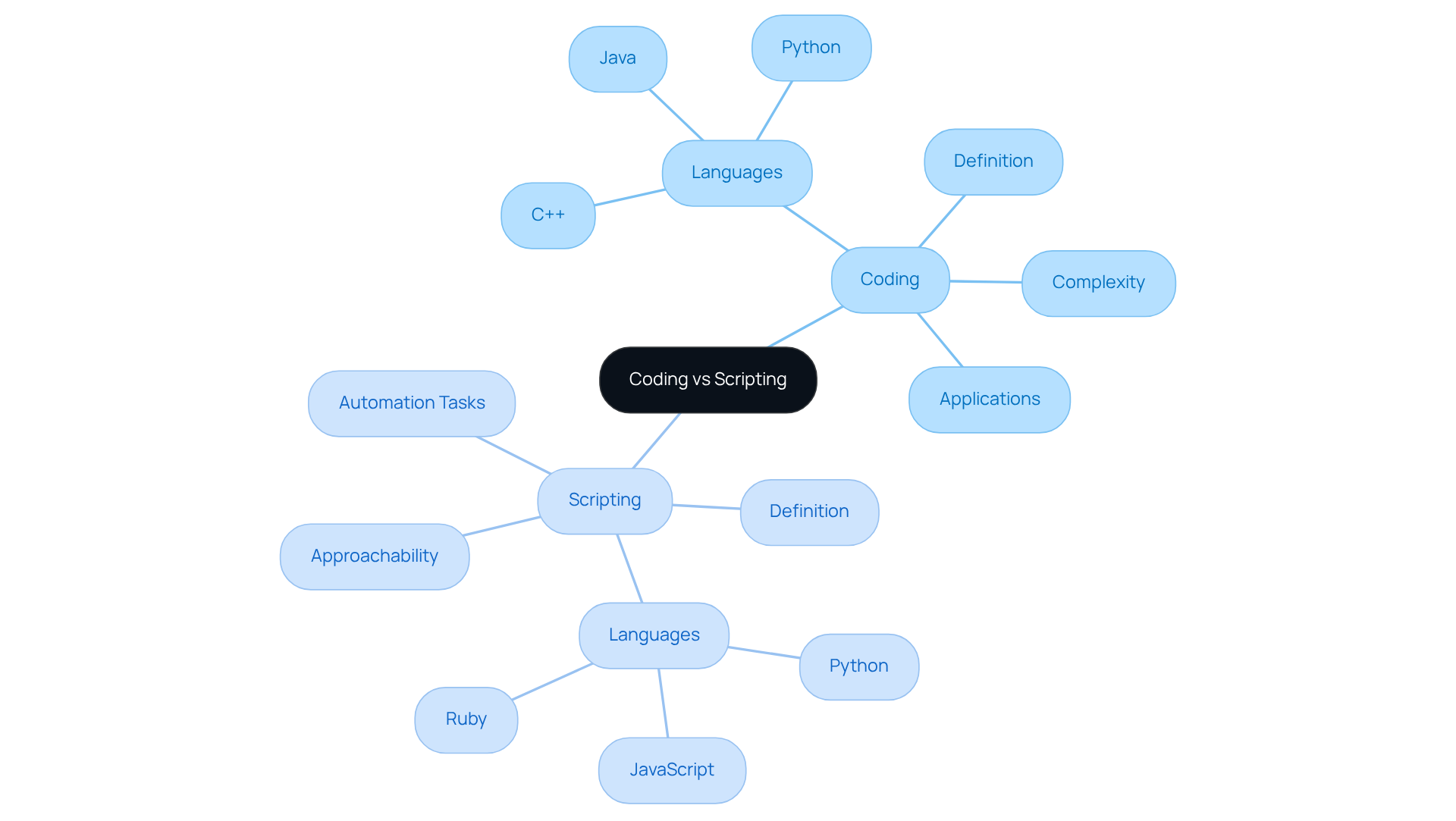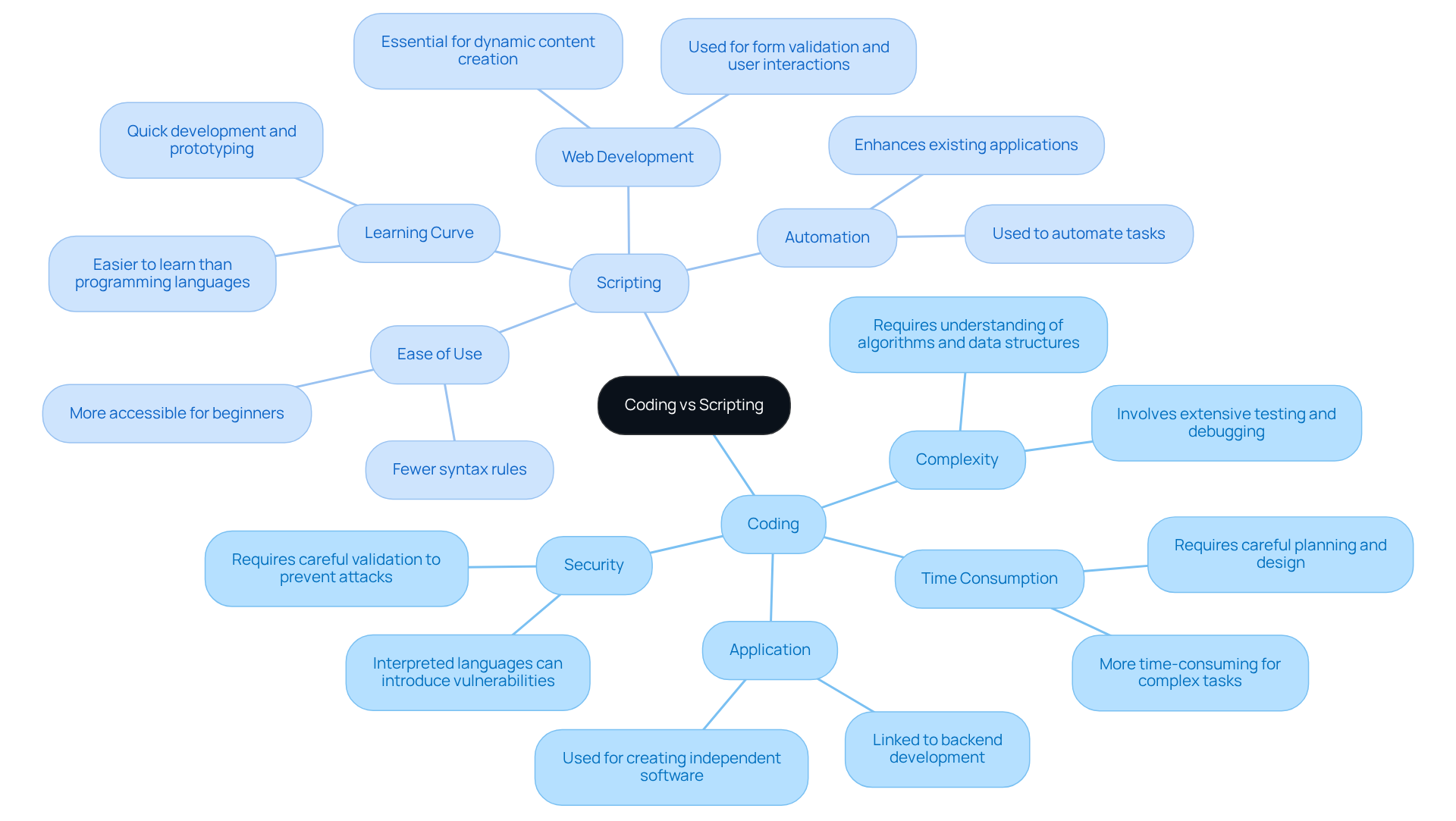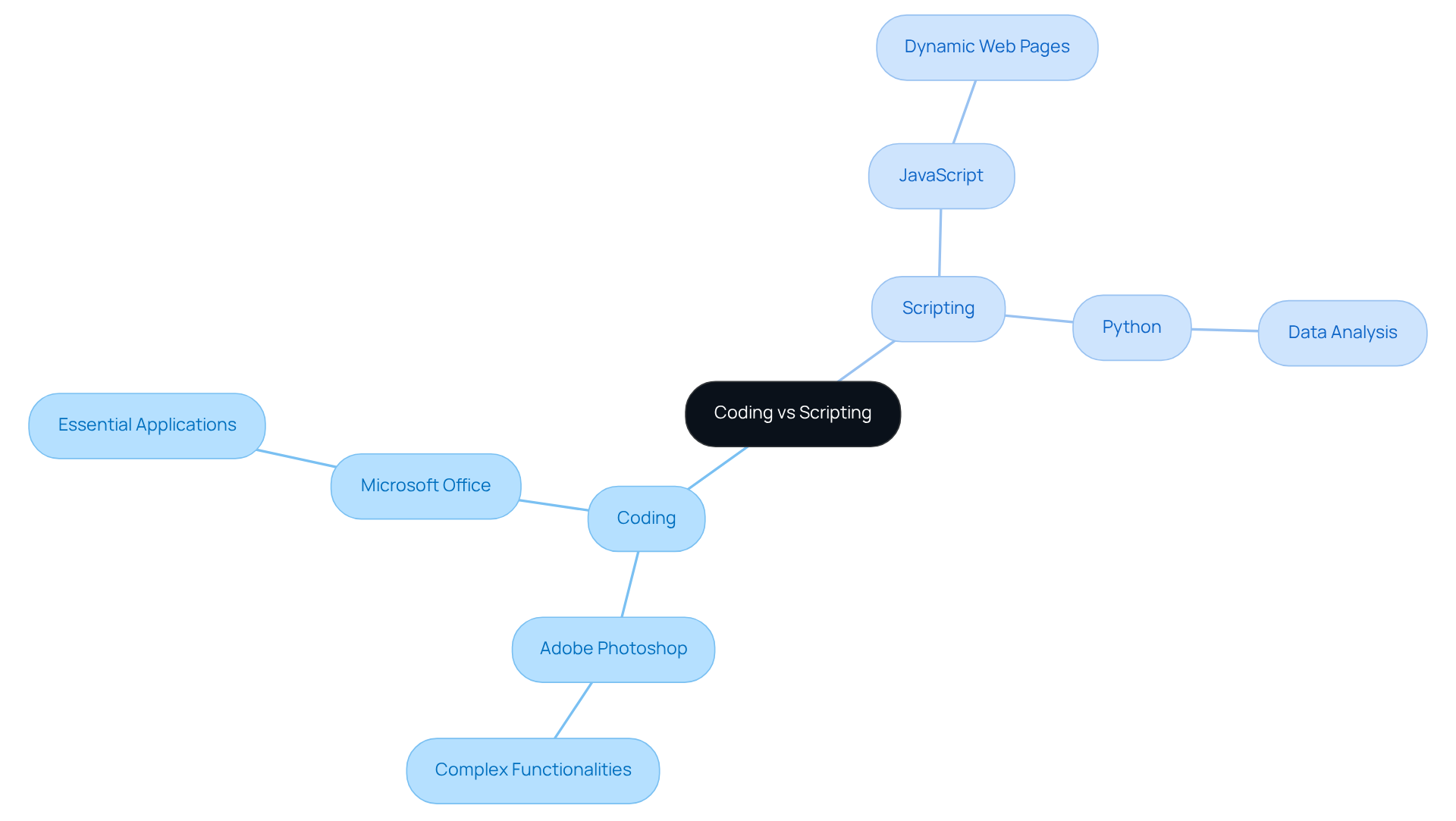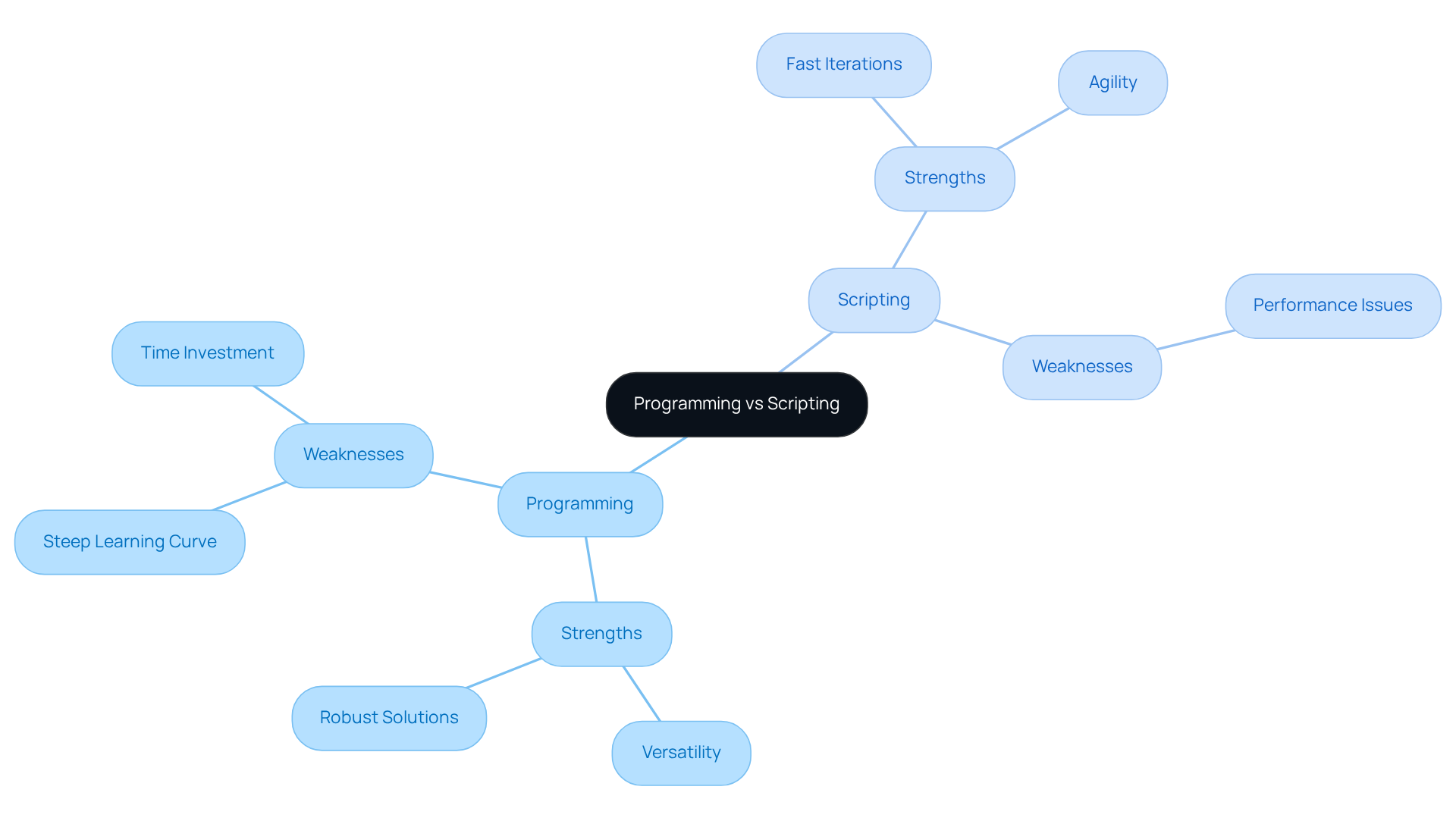Overview
Navigating the world of technology can be daunting, especially when it comes to understanding the differences between coding and scripting. Many individuals face the challenge of grasping these concepts, which can feel overwhelming. Coding often requires a deeper understanding of programming principles, as it involves creating independent software. This complexity can lead to frustration for those who are just starting out. On the other hand, scripting offers a more approachable way to automate tasks and enhance existing applications with simpler syntax.
Consider how coding is essential for developing intricate systems; it’s a skill that can open doors to countless opportunities. Yet, for many, the thought of diving into such complexity can be intimidating. Scripting languages like JavaScript and Python, however, provide a solution by facilitating quicker execution and ease of use for automating repetitive processes. These tools can empower individuals to streamline their work without needing to become programming experts.
We understand that every journey in tech comes with its own set of challenges, and it’s important to recognize that you are not alone. Many have walked this path and found success by embracing both coding and scripting in their projects. By sharing experiences and learning from one another, we can create a supportive community that nurtures growth and confidence. Remember, whether you choose to delve into coding or opt for the simplicity of scripting, each step you take brings you closer to your goals.
Introduction
In the world of software development, many tech startup founders find themselves caught in the confusing overlap between coding and scripting. This distinction can feel daunting, especially when both skills are essential for success. Coding is often seen as the art of creating standalone applications, while scripting is about automating tasks within existing frameworks. Understanding these nuances can be the key to unlocking new levels of productivity and efficiency. Yet, as the tech landscape continues to evolve, a crucial question emerges: how can developers effectively harness both coding and scripting to tackle the challenges of modern programming and enhance their innovative potential?
We recognize the struggle you may face in navigating these complexities, and we are here to support you. By fostering a deeper understanding of both practices, you can not only streamline your workflow but also embrace the opportunities that arise from innovation. Let’s explore together how you can leverage these skills to transform your development process and drive your startup forward.
Define Coding and Scripting: Core Concepts
Coding often presents a challenge for many, as it involves composing directives for computers to execute specific functions, typically resulting in independent programs or software. This process requires a solid understanding of programming languages like C++, Java, or Python to create intricate systems. On the other hand, scripting can feel more approachable, as it entails writing smaller programs or scripts that automate processes or manage existing applications. Scripting languages, such as JavaScript, Python, and Ruby, are frequently interpreted rather than compiled, enabling quicker execution and easier debugging. In the discussion of coding vs scripting, coding is generally more complex and demands a deeper grasp of programming principles, whereas script writing is often seen as more user-friendly, focusing on automating repetitive tasks or enhancing existing functionalities.
Maren Vernon, a WordPress instructor, aptly points out that "the process of writing scripts is code utilized to automate tasks that would otherwise require being carried out sequentially by a web developer." This insight highlights the practical benefits of coding in simplifying workflows and boosting productivity. In 2025, around 70% of developers reported using programming languages for automation tasks, indicating a significant trend toward leveraging these languages for enhanced productivity compared to traditional programming methods.
The distinctions between coding vs scripting extend beyond mere definitions; they have real implications in practical applications. For instance, Bit.ai's knowledge management suite illustrates how coding can foster collaboration and project management by automating document creation and organization. This showcases the invaluable role of coding in modern development environments, providing solutions that resonate with the needs of tech startup founders.
By embracing both coding vs scripting, you can navigate the complexities of software development with greater ease, ultimately enhancing your productivity and workflow. Remember, you are not alone in this journey; many others share your experiences and challenges. Together, we can explore these tools to find the right balance that suits your unique needs.

Differentiate Coding and Scripting: Key Characteristics
The essential distinction between coding vs scripting often presents a challenge for many tech startup founders, who may feel overwhelmed by the complexity of these concepts. Coding, which involves the creation of independent software, demands a thorough comprehension of algorithms, data structures, and system architecture. This process can be time-consuming and often requires extensive testing and debugging to ensure functionality.
On the other hand, scripting is typically easier and faster to implement, focusing on automating processes and enhancing existing applications. Scripting languages like PHP and JavaScript are more accessible for beginners, featuring fewer syntax rules that can ease the learning curve. As Adarsh Kumar Singh points out, programming languages are generally simpler to grasp and are frequently used to automate processes, helping to manage computer systems more efficiently.
While programming is often linked to backend development, scripts play a crucial role in web development, enabling essential functions such as form validation and dynamic content creation. This connection between scripting and broader programming activities highlights the importance of understanding both areas. Developers often find themselves investing less time on automation tasks compared to coding activities, which allows for quicker prototyping and testing.
Industry experts emphasize that the straightforwardness of programming languages enables developers to implement features with a single set of instructions, optimizing the development process and enhancing productivity. However, it’s vital to recognize that programming languages are interpreted, meaning the code is executed by an interpreter at runtime, which can introduce security vulnerabilities like code injection attacks.
Ultimately, the comparison of coding vs scripting shows that while scripting offers efficiency and ease of use, programming languages grant more power and flexibility for tackling complex tasks. By understanding these distinctions, tech startup founders can make informed decisions about the tools and approaches they choose, fostering a more supportive and productive development environment.

Explore Applications: Where Coding and Scripting Shine
In today's fast-paced tech landscape, many founders face the challenge of developing complex software programs, such as operating systems, mobile apps, and enterprise-level solutions. This task can often feel overwhelming, especially when performance, security, and scalability are at stake. It's important to recognize that in the discussion of coding vs scripting, coding serves as the backbone of essential applications like Adobe Photoshop and Microsoft Office, where intricate functionalities are not just beneficial but necessary for success.
However, there's also a powerful ally in the debate of coding vs scripting, as scripting excels in automating repetitive tasks and enhancing user interactions on websites. Consider how JavaScript is widely used for client-side programming to create dynamic web pages, or how Python scripts can streamline data analysis in data science projects. These tools are not just technical necessities; they are key to optimizing workflows and improving user experiences.
Ultimately, while coding vs scripting lays the foundation for robust software, automation provides a way to nurture and enhance the user journey. By embracing both coding vs scripting, you can create a more seamless and supportive environment for your users, helping your startup thrive in a competitive landscape.

Assess Strengths and Weaknesses: Pros and Cons of Each
Programming can often feel like a daunting journey, especially with its steep learning curve and the significant time investment required. Many tech startup founders may find themselves overwhelmed by the complexities involved in developing optimized and secure software. This challenge can weigh heavily, as it often feels like a barrier to achieving their goals. Yet, there’s a silver lining: programming offers remarkable versatility in managing intricate tasks and can lead to robust solutions that truly elevate a project.
However, it’s important to recognize that not all programming languages are created equal when discussing coding vs scripting. Interpreted languages, while user-friendly and perfect for quick automation tasks, may sometimes fall short in performance and scalability compared to their compiled counterparts. This can be a real concern for larger applications, where efficiency is key. As you navigate these choices, it’s essential to understand that while coding can extend development cycles, it also opens the door to more thorough and resilient outcomes.
On the other hand, when considering coding vs scripting, scripting languages can facilitate faster iterations and updates, allowing for a more agile development process. This agility can be a game changer, especially for startups that need to pivot quickly in response to market demands. By understanding these strengths and weaknesses, you can make informed decisions that align with your project’s needs. Remember, you’re not alone in this journey; many have faced similar challenges and emerged stronger. Embracing the right approach can lead to success, fostering a supportive environment for growth and innovation in your projects.

Conclusion
Navigating the complexities of software development can feel overwhelming, especially when it comes to understanding the distinctions between coding and scripting. Many founders grapple with this challenge, often feeling uncertain about where to focus their efforts. Coding typically involves creating standalone programs, demanding a deep understanding of programming languages, while scripting offers a more user-friendly approach to automating tasks and enhancing existing applications. This fundamental difference highlights the unique roles each plays in the tech landscape, catering to diverse needs and skill levels.
It's important to recognize that coding can be intricate, requiring extensive testing and a grasp of complex concepts. On the other hand, scripting provides a quicker, more accessible means to achieve automation and improve user interactions. The applications of both coding and scripting are vast, from developing robust software solutions to streamlining workflows and enhancing user experiences. By acknowledging these differences, you can empower yourself to make informed decisions that align with your project goals, ultimately optimizing your development processes.
Embracing both coding and scripting can significantly enhance your productivity and innovation within a startup environment. As the tech landscape continues to evolve, understanding how to leverage these tools effectively will be crucial for your success. Whether you aim to build sophisticated applications or automate routine tasks, finding the right balance between coding and scripting can lead to a more efficient and supportive development journey. Remember, you’re not alone in this; many have walked this path and found ways to thrive by integrating both approaches into their workflows.
Frequently Asked Questions
What is coding?
Coding involves composing directives for computers to execute specific functions, resulting in independent programs or software. It requires a solid understanding of programming languages like C++, Java, or Python.
What is scripting?
Scripting entails writing smaller programs or scripts that automate processes or manage existing applications. Scripting languages, such as JavaScript, Python, and Ruby, are often interpreted rather than compiled, allowing for quicker execution and easier debugging.
How do coding and scripting differ in complexity?
Coding is generally more complex and requires a deeper understanding of programming principles, while scripting is considered more user-friendly, focusing on automating repetitive tasks or enhancing existing functionalities.
What are the practical benefits of scripting?
Scripting simplifies workflows and boosts productivity by automating tasks that would otherwise need to be performed sequentially by a web developer.
What trend was reported by developers regarding automation tasks in 2025?
In 2025, around 70% of developers reported using programming languages for automation tasks, indicating a significant trend toward leveraging these languages for enhanced productivity compared to traditional programming methods.
How can coding contribute to collaboration and project management?
Coding can foster collaboration and project management by automating document creation and organization, as illustrated by Bit.ai's knowledge management suite.
How can understanding both coding and scripting benefit individuals in software development?
Embracing both coding and scripting allows individuals to navigate the complexities of software development with greater ease, ultimately enhancing productivity and workflow.




